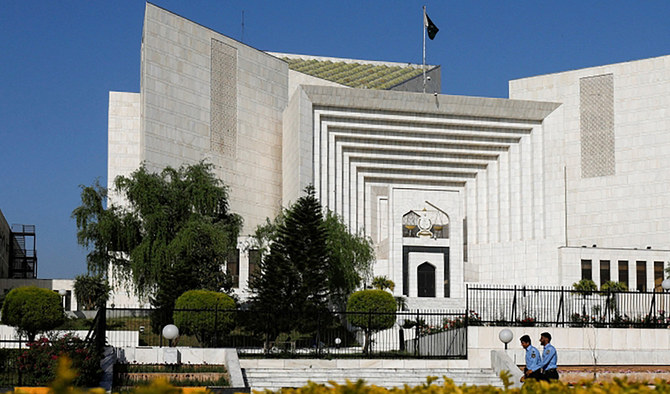ISLAMABAD: Pakistan’s top court on Thursday dismissed the government’s request to stop former prime minister Imran Khan from launching his anti-government “long march” toward the federal capital to force the ruling coalition to announce fresh elections in the country.
Khan, who was ousted from power in a no-confidence vote in April, reiterated his demand for snap polls earlier this week while saying he would not delay his protest march to Islamabad beyond October.
The former prime minister’s Pakistan Tehreek-e-Insaf (PTI) party also brought its workers and followers to the federal capital in May while hoping to bring down the government. However, its top leaders told the party sympathizers to disperse after clashes with police.
The government recalled the previous march carried out by Khan’s party in a contempt petition filed in the Supreme Court, saying the PTI had flouted the court order which specified where the demonstration was going to be held in the city.

Pakistani former prime minister and leader of the opposition party Pakistan Tehreek-e-Insaf (PTI) Imran Khan (front 2R) waves to supporters during a protest rally against the inflation, political destabilisation and continued hikes in fuel prices, in Rawalpindi on July 2, 2022. (AFP/File)
It also demanded that Khan, who was threatening another protest demonstration in his public rallies, be stopped from creating a similar situation at a time when the government was trying to provide relief to flood-affected people in Pakistan.
“You are telling us [the PTI] has planned a march and a sit-in again,” said Chief Justice Umar Ata Bandial was quoted by Dawn newspaper as saying. “You can deal with the situation in accordance with the law. As of now, there are only speeches. You should take steps wherever there are threats in cities.”

Supporters of the opposition party Pakistan Tehreek-e-Insaf (PTI) march during a protest rally against inflation, political destabilisation and continued hikes in fuel prices, in Rawalpindi on July 2, 2022. (AFP/File)
“You should request [the court] to stop the crowd when people gather,” he continued. “There is no crowd right now.”
Attorney General of Pakistan Ashtar Ausaf told the court during the hearing the PTI’s previous protest march had affected the citizens’ rights in and around Islamabad. He said this was despite the fact that the party had submitted an affidavit wherein it had promised not to create inconvenience for people.
“The court order [also] allocated a specific place but the sit-in was brought to D-Chowk, which resulted in material losses,” he continued. “The court should punish those who violated its orders.”
Later, the hearing was adjourned until October 26.


















